September 1912
| << | September 1912 | >> | ||||
|---|---|---|---|---|---|---|
| Su | Mo | Tu | We | Th | Fr | Sa |
| 1 | 2 | 3 | 4 | 5 | 6 | 7 |
| 8 | 9 | 10 | 11 | 12 | 13 | 14 |
| 15 | 16 | 17 | 18 | 19 | 20 | 21 |
| 22 | 23 | 24 | 25 | 26 | 27 | 28 |
| 29 | 30 | |||||

September 28, 1912: Thousands sign the Ulster Covenant
September 22, 1912: Edwin Armstrong makes first successful test of the revolutionary regnerative circuit
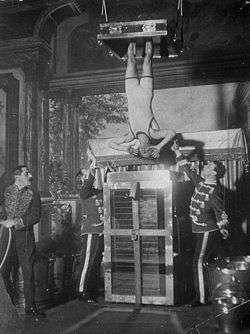
September 21, 1912: Houdini unveils most dangerous act yet
The following events occurred in September 1912:
September 1, 1912 (Sunday)

Fisher: "A road across the United States!"
- At Indianapolis, entrepreneur Carl G. Fisher, President of the Prest-O-Lite Company and founder of the Indianapolis 500 race, hosted a dinner for his colleagues in the automotive industry and unveiled his plans for the Lincoln Highway. "A road across the United States! Let's build it before we're too old to enjoy it!" The auto trail, which paved roads to connect existing highways, would run from New York City to San Francisco, and would be completed in 1925.[1]
- In Morocco, French troops put down a native uprising.[2]
- Born: Bernard Sarnat, American plastic surgeon and developer of craniofacial surgery techniques, in Chicago (d. 2011)[3]
- Died: Samuel Coleridge-Taylor, 37, English composer, nicknamed "The African Mahler", contributor to the epic poem The Song of Hiawatha (b. 1875)
September 2, 1912 (Monday)
- The first Calgary Stampede was held, lasting for six days, running for six days and attracting 80,000 people.[4]
- U.S. President William Howard Taft signed an executive order establishing the first "Naval Petroleum Reserve" (NPR-1) to be used for the United States Navy in the event of war. NPR-1 was located at a government-owned oil field in Kern County, California.[5]
- Woodrow Wilson opened his presidential campaign with a Labor Day address in Buffalo, New York.[6]
- In the United Kingdom, the Trades Union Congress president Will Thorne opened the TUC's annual conference with a demand for common ownership and an attack on the government for its behavior in the recent strikes.[2]
- Born: Xuân Thủy, Vietnamese public servant, Foreign Minister of North Vietnam, in Hà Đông District, French Indochina (d. 1985); David Daiches, British literary critic, author of The Place of Meaning in Poetry and A Critical History of English Literature, in Sunderland, England (d. 2005); Imre Finta, Hungarian-Canadian army officer, first person prosecuted of war crimes under Canadian law, in Kolozsvár, Austria-Hungary (now Cluj-Napoca, Romania) (d. 2003)
September 3, 1912 (Tuesday)
- Sheik Shawish was arrested in Cairo on charges of conspiracy against Lord Kitchener and the Khedive.[7]
- Nobody won a majority in the election for Governor of Vermont, and the matter was sent to the state legislature to decide on October 2.[8]
- Prince Arthur, Governor General of Canada, officially opened the Alberta Legislature Building in Edmonton, although construction on the provincial government building still continued until 1913.[9]
- Arnold Schoenberg's Opus No. 16, composed in 1909 and entitled Five Pieces for Orchestra, was given its first public performance. Sir Henry Wood conducted the premiere at the Queen's Hall in London.[10]
September 4, 1912 (Wednesday)
- The Albanian Revolt ended, as the Ottoman Empire agreed to the demands of Albanian rebels in its Montenegro province.[11]
- Fourteen people were killed in a coal mine explosion at the Clarence Coal Company at Pas-de-Calais, France.[7]
- In London, 22 were injured in a tube collision on the Piccadilly line, the first ever such accident on London Underground.[2]
- Died: William John McGee, 59, American geologist, note for his surveys of the Mississippi Valley and the quaternary lakes of California and Nevada (b. 1853)
September 5, 1912 (Thursday)
- A ship, bringing the monument to commemorate the French victory of Napoleon over the Russians at Borodino, sank, killing all on board.[7]
- Fifteen Christians were massacred by the Turks at Heimeli, near Scutari.
- Arthur MacArthur Jr., former Governor-General of the Philippines, and father of future General Douglas MacArthur, suffered a fatal stroke while delivering an address to a reunion of the 24th Wisconsin regiment that he had commanded during the American Civil War. MacArthur was in Milwaukee, and after he recounted "one of the most remarkable scouting expeditions of the war", he told his men, "Your indomitable courage...", then halted his speech with the words, "Comrades, I am too weak to go on." He sat back down and collapsed, dying moments later.[12]
- Born: John Cage, American composer, leading figure in avant-garde music in the United States, including works such as 4′33″, in Los Angeles (d. 1992)
September 6, 1912 (Friday)
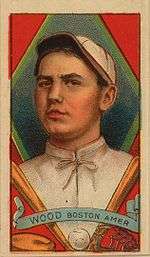
Wood
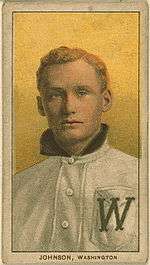
Johnson
- The uprising of Moroccan pretender Ahmed al-Hiba was ended in a battle at Sidi Bou Othmane, as his force of 10,000 troops was decimated by 5,000 French troops led by Colonel Charles Mangin. The poorly armed Moroccan tribesmen, promised by al-Hiba "that French bullets would turn into water and French shells into watermelons", charged at Mangin's troops, who were aligned in a square formation with artillery at the center. Within two hours, 2,000 of al-Hiba's troops were dead and thousands more wounded; French losses were four dead and 23 wounded.[13]
- In what has been described as "the most anticipated and hyped sporting event"[14] up to that time, the two best pitchers in the American League, Smoky Joe Wood of the Boston Red Sox and Walter Johnson of the Washington Senators, faced off against each other before an overflow crowd at Fenway Park. Wood was on a winning streak of 13 consecutive games, while Johnson had set a record of 16 straight wins the previous month. In a pitcher's duel, the two each threw five scoreless innings, until Johnson allowed a run to score in the sixth, the margin for a 1-;0 victory for Wood and the Red Sox. Wood would go on to win two more games to tie, but not break, Johnson's record.[15]
- Roland Garros of France broke the record for altitude in an airplane, reaching 16,405 feet at Houlgate, near Trouville.[16]
September 7, 1912 (Saturday)
- The Madeira-Mamoré Railroad was completed, under the direction of American businessman Percival Farquhar, after five years with the driving of a golden spike to link the track.[17]
- Playing at the Chicago Golf Club in Wheaton, Illinois, Jerome Travers won the United States golf championship for the third time.[18]
- Themistoklis Sofoulis, exiled leader of the Greek people on the island of Samos, landed with a force of Greek volunteers and drove away the Ottoman Empire troops there.[19]
- At the Christ Episcopal Church in Harvard, Illinois, Miss Dorothy Gardner was married to Mr. Leslie King. Shortly after their son, Leslie Lynch King Jr., was born on July 14, 1913, Dorothy King would leave her husband, taking her child with her, and file for divorce. She would remarry in 1917, renaming Leslie Jr. as Gerald Ford, who would grow up to become the 38th President of the United States.[20]
- French Army troops, led by Colonel Charles Mangin rescued nine French civilians who had been taken hostage by Moroccan pretender El Hiba at Marrakesh, but El Hiba himself escaped, setting the stage for a final battle later.[21]
- Born: David Packard, co-founder (with Bill Hewlett) of Hewlett-Packard, in Pueblo, Colorado (d. 1996)
- Died: Bugs Raymond, 30, pitcher for the Detroit Tigers, St. Louis Cardinals, and New York Giants, following a fractured skull sustained in a bar fight (b. 1882)
September 8, 1912 (Sunday)
- Motorcyclist Eddie Hasha lost control of his bike during a race at the Vailsburg Motordrome in Newark, New Jersey, killing himself, six spectators and another racer, John Albright. Another 17 people in the crowd were injured.[22]
- Four spectators were killed and almost 20 injured when Pierre Biard lost control of his airplane and plowed into the crowd at an air meet in Gray, Haute-Saône, France.[23]
- Born: Alexander Mackendrick, American-Scottish film director, known for films The Ladykillers and Sweet Smell of Success, in Boston (d. 1993)
September 9, 1912 (Monday)
- Marko Trifković resigned as Prime Minister of Serbia, along with his cabinet.[7]
- A new comet was discovered by Australian astronomer Walter Frederick Gale.[7]
- In Athens, mass demonstrations demanded the liberation of all Greeks from Ottoman rule.[2]
September 10, 1912 (Tuesday)
- A bomb explosion at a market at the Macedonian town of Doiran, near Salonika, killed 20 and injured 30.[24]
- The Bank in Winterthur and Toggenburger Bank merged to form the Union Bank of Switzerland in Zürich.[25]
- Nippon Katsudō (Activity) Film Production, as predecessor of Nikkatsu, a film production and operating company in Japan, founded in Kyoto.
September 11, 1912 (Wednesday)
- Italian Army Captain Riccardo Moizo became the first pilot to become a prisoner of war after his Nieuport airplane was forced to land at Azizia in Libya during the Italo-Turkish War.[26]
- Etta Duryea Johnson, 31, white wife of African-American boxing champion Jack Johnson died from a self-inflicted gunshot wound to the head.[27][28]
- Born: Robin Jenkins, Scottish writer, author of The Cone Gatherers, in Cambuslang, Scotland (d. 2005)
September 12, 1912 (Thursday)

Raymond Poincaré
- After French Prime Minister Raymond Poincaré signed an agreement in Moscow with the Russian Empire, Russia ratified the Franco-Russian Convention, providing that if the German Empire mobilized its troops, France and Russia would do the same.[29]
- Born: Feroze Gandhi, Indian journalist and activist, publisher of the National Herald and Navjivan, husband of Indira Gandhi and father of Rajiv Gandhi who both served as Prime Minister of India after his death, and son-in-law of Prime Minister Jawaharlal Nehru, in Bombay (d. 1960)
September 13, 1912 (Friday)
- The funeral of the Emperor Meiji was held at Tokyo, after which the body was taken on its journey to Motoyama, Japan.[30] Following the Emperor's funeral, former General Nogi Maresuke, 62, committed ritual suicide with his 52-year old wife Nogi Shizuku. Maresuke had requested Emperor Meiji twice when he was alive for the monarch's permission to allow him to commit suicide and restore honor to his family after he lost too many men in the Battle of Port Arthur that opened the Russo-Japanese War.[31]
- The government of Santo Domingo (now the Dominican Republic) was threatened by revolution, prompting the United States to send aid.[7]
- Born: Reta Shaw, American actress, best known for her supporting role in the 1960s supernatural television series The Ghost & Mrs. Muir, in South Paris, Maine (d. 1982)
September 14, 1912 (Saturday)
- Groundbreaking was held for the Trans-Australian Railway, with Governor-General Lord Denman turning the first spade of earth at Port Augusta, South Australia.[7] The railroad, which stretches to Kalgoorlie, Western Australia would be completed on October 17, 1917.[32]
- Montenegro entered into an alliance with Serbia.[33]
- Rioting at a soccer football match at Belfast injured 100 people.[34]
September 15, 1912 (Sunday)
- In fighting between French forces and Moorish tribesmen at Sidi Kacem in Morocco, nine French soldiers were killed and 30 wounded.[7]
- Ten recruits and a gunner's mate at the United States Navy training school at Chicago were drowned in the capsizing of a launch at Lake Michigan.[35]
- John Flammang Schrank, a bartender from New York City, began working on his plan to assassinate former U.S. President Theodore Roosevelt, after having a dream that the late U.S. President William McKinley had pointed to Roosevelt and said, "This is my murderer, avenge my death." Schrank would catch up with Roosevelt, who was campaigning for a new term as President, on October 14.[36]
- On the 91st anniversary of its independence, El Salvador adopted the flag that it uses today, restoring the blue and white tricolor flag that it had abandoned in 1865.[37]
September 16, 1912 (Monday)
- A typhoon, with winds of more than 200 miles per hour, struck the city of Taito on the Japanese-controlled island of Formosa (now Taitung City of Taiwan). The winds killed 107 people, injured 293, and destroyed 91,400 houses. In addition, the storm sank the city's fishing boats and ruined the rice and sugar crops.[38]
- Liang Ju-hao became the new Foreign Minister of China.[7][39] The initial dispatch from foreign correspondent mistakenly stated that "the new Minister is unable to read the Chinese language, though he is well educated from the Western point of view", which would cause the Times of London to run a correction on November 15.[40]
September 17, 1912 (Tuesday)
- Starting at midnight, the Kingdom of Greece began drafting its adult male citizens into the Army and Navy in preparation for war.[41]
- Fifteen people were burned to death and 14 injured when a train caught fire at the Ditton railway station in Ditton, Cheshire, England.[7]
- French aviator Georges Legagneux broke the altitude record, reaching 18,767 feet over Houlgate, France.[42]
- In a battle at Derna in modern-day Libya, 1,000 Turks and Arabs were killed, and 61 Italian forces died.[43]
September 18, 1912 (Wednesday)
- Representatives of the four-nation banking consortium informed China's finance minister Zhou Xuexi, that the railway loan was subject to four conditions, including repayment through a new tax on salt, bank consortium approval of any financial reforms, and appointment of technicians from the four nations.[44]
September 19, 1912 (Thursday)
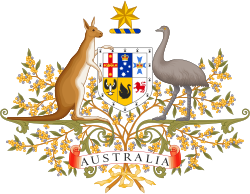
new version
.svg.png)
old version
- The current Coat of arms of Australia was formally approved, after Prime Minister Andrew Fisher made various changes to the 1908 version.[45]
September 20, 1912 (Friday)
- Sir Muirhead Collins, the Secretary of the Australian Department of Defence, approved a recommendation from the Army Chief of General Staff to create the Australian Flying Corps, beginning with the purchase of five aircraft and the hiring of two flight instructors.[46]
- Salar-ed-Dowleh, pretender to the throne of Persia (now Iran) and uncle of the reigning Shah, captured the western city of Kermanshah, Persia.[7]
- The "first transcontinental truck delivery" in the United States was completed when truck manufacturer ALCO (the American Locomotive Company) completed the transportation of three tons of Parrot Soap, specifically its olive silk variety. Delivery was made to the San Francisco City Hall, 91 days after an ALCO truck had started from Philadelphia.[47]
- Born: Frank Zeidler, American politician, member of the Socialist Party of America, 35th Mayor of Milwaukee, serving 1948 to 1960, in Milwaukee (d. 2006)
September 21, 1912 (Saturday)
- The first six-point touchdowns were scored in Carlisle Indian School's 50-7 win over Albright College, and Rhode Island's 7-0 defeat of Massachusetts Agricultural (now University of Massachusetts Amherst). Previously, touchdowns had been worth five points.[48]
- Harry Houdini gave the first public performance of his latest death-defying act, the escape from the Chinese Water Torture Cell. The trick, never done before by anyone, required Houdini to get out of a locked steel and glass tank of water while hanging upside-down. Houdini accomplished the stunt before an audience at the Circus Busch in Berlin.[49]
- Zane Grey, the well-known Western novelist, co-founded the "Porpoise Club" with his friend Robert H. Davis of Munsey's Magazine, to popularize the sport of hunting of dolphins and porpoises. Their first catch off of Sea Bright, New Jersey, where they harpooned and then reeled in a bottlenose dolphin.[50][51]
- Born: Ted Daffan, American country musician, known for country hits including "Truck Drivers' Blues", in Beauregard Parish, Louisiana (d. 1996)
September 22, 1912 (Sunday)
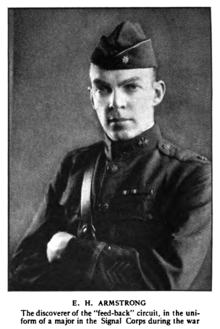
Edwin H. Armstrong
- Edwin Howard Armstrong, a 21-year-old electrical engineering student at Columbia University, made the first successful test of his invention, the regenerative circuit, amplifying faint radio signals to normal levels by repeatedly feeding current through the relatively new Audion grid. The regenerative circuit revolutionized the reception of radio waves, and, with in a few months, was used to improve radio transmission.[52]
- Greece and Bulgaria strengthened their defense alliance, signed in May, with details for conditions and procedures for mobilization of their armed forces.[53]
- Born: Alfred Gwynne Vanderbilt Jr., American horse racing magnate, son of Alfred Gwynne Vanderbilt in London (d. 1999)
September 23, 1912 (Monday)
- U.S. President William Howard Taft issued an executive order barring foreign ships, whether commercial or military, ships from the waters of Hawaii's Pearl Harbor, Cuba's Guantánamo Bay, and the Philippines' Subic Bay. The entire island of Guam was ordered completely off limits, effectively cutting its civilian population off from the outside world, with restrictions remaining in place until the 1950s.[54]
September 24, 1912 (Tuesday)
- The Ottoman Empire mobilized its European forces, with 175,000 in the Western Army at North Macedonia and 115,000 in the Eastern Army at Thrace.[55]
- A group of 750 U.S. Marines was dispatched to the Dominican Republic to protect American interests.[56] The U.S. intervention led to a temporary halt in the civil war that had begun after the assassination of President Ramón Cáceres in November 1911.[57]
- Born: Robert Lewis Taylor, American writer, author of The Travels of Jaimie McPheeters, in Carbondale, Illinois (d. 1998)
- Died: Adolf Marschall von Bieberstein, 69, German diplomat, former Foreign Minister of Germany (b. 1842)
September 25, 1912 (Wednesday)
- The first radio transmissions from Antarctica were made, as a station on Macquarie Island was set up by five men from the Australasian Antarctic Expedition.[58]
- In Nicaragua, General Luis Mena and 700 rebels surrendered when confronted by a 2,700 member force of U.S. Marines and U.S. Navy Bluejackets.[59]
- British and French cruisers landed marines to protect foreigners on the island of Samos.[7]
- The cornerstone of the new Students' Building was laid at Vassar College in Poughkeepsie, New York.[60]
September 26, 1912 (Thursday)
- The Elks of Canada fraternal organization, a counterpart to the American club, Benevolent and Protective Order of Elks, was founded in Canada. Currently the organization describes themselves: "The Elks of Canada is the largest, all-Canadian, fraternal organization in Canada with nearly 14,000 members in over 250 locations throughout the country."[61]
- The Australian Inland Mission was created by decision of the members of the General Assembly of the Presbyterian Church of Australia. Organized by Presbyterian minister John Flynn, the A.I.M. sought to bring the Christian faith into Australia's outback, and to fulfill a secondary mission of insuring that "hospital and nursing facilities are provided within a hundred miles of every spot in Australia where women and children reside".[62]
- French aviator Charles Voisin was killed in a car accident near Belleville, Rhône, France.[7]
- Born: Preston Cloud, American paleontologist, best known for developing the geologic time scale and research into the Cambrian explosion, in Upton, Massachusetts (d. 1991)
September 27, 1912 (Friday)
- Leslie King began abuse of his new bride, Dorothy King, while the couple were on their honeymoon at the Multnomah Hotel in Portland, Oregon. The incident was the first of many recited in Mrs. King's divorce petition, found by historians later, after the couple's child had grown up to become U.S. President Gerald Ford.[20]
September 28, 1912 (Saturday)
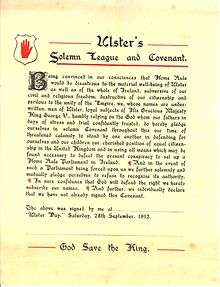
Ulster Covenant
- Signing of the Ulster Covenant, a protest by adult citizens of the province in northern Ireland against a proposal to give Ireland self-government apart from Great Britain, was completed. Over a period of six days, beginning on September 23, the Covenant was signed by 237,368 men, while a companion document, the Ulster Declaration, was signed by 234,046 women,[63] virtually the entire adult Protestant population of Ulster.[64]
- In protest over the National Insurance Act, a majority of British doctors resigned their contracts with medical clubs.[7]
- The French dreadnought Paris, with twelve 12-inch guns and 26 smaller cannons and described as "the most formidable ship in the French Navy", was launched at Touloun, France.[65]
- At Seoul, 106 Koreans were sentenced on charges of conspiracy against Count Terauchi, with terms of 5 to 10 years. The most prominent of the convicts, former Korean cabinet minister Baron Yun Chi Ho, got a ten-year sentence. Nine other prisoners were released.[66]
- Corporal Frank S. Scott of the United States Army became the first enlisted service member to lose his life in an airplane accident. He and Lt. Lewis C. Rockwell perished in the crash of a Wright Model B at College Park, Maryland.[67]
September 29, 1912 (Sunday)
- The first IAAF world record for the javelin throw was set by Eric Lemming of Sweden, at 62.32 meters (204.46 feet).[68]
- The first airplane flight in Venezuela was made by Frank Boland, who circled Caracas for 27 minutes in a plane made of bamboo.
- French and British Marines captured the city of Vathy on the island of Samos.[7]
- Born: Michelangelo Antonioni, Italian film director, known for films including L'Avventura and Blowup, in Ferrara, Italy (d. 2007)
September 30, 1912 (Monday)
September 30, 1912: Columbia School of Journalism opens
- Six British explorers, who had been left stranded in Antarctica by the Terra Nova Expedition, were able to leave the ice cave where they had stayed for seven months during a harsh winter. The men—Commander Victor Campbell, Dr. Murray Levick, Raymond Priestly, George Abbott, Frank Browning and Seaman Harry Dickason—still had to walk 200 miles to Cape Evans before their ordeal would be over.
- The prestigious Columbia School of Journalism, provided for by the will of Joseph Pulitzer, opened at Columbia University, with a class of 79 students.[69]
gollark: Oh, yes, that too.
gollark: Trouble is that ECC stuff in CC currently is... not fast.
gollark: The door lock would then verify that the message was actually signed with the key, and the times are close enough.
gollark: The door lock or whatever would store the public key, the pocket computer the private key, and the pocket computer would constantly broadcast a message containing the current time, signed with its private key.
gollark: Just thinking about it, the most secure way might be a pocket computer sending sender-verified signals based on the current time.
References
- Michael McCoy, Bicycling the Lewis & Clark Trail (Globe Pequot, 2003) pp. 47-48
- "The 20th Century Day by Day", edit. Derrik Mercer (Dorling Kindersley, 1999) p. 169
- "Obituary: Bernard Sarnat, 99, UCLA professor, pioneer in field of craniofacial biology", by Amy Albin, UCLA Newsroom, November 3, 2011
- "Calgary Stampede History", The Calgary Stampede Historical Committee
- Marius Vassiliou, The A to Z of the Petroleum Industry (Scarecrow Press, 2009) p. 332
- Mario R. Di Nunzio, ed., Woodrow Wilson: Essential Writings and Speeches of the Scholar-President Woodrow Wilson, (NYU Press, 2006) p. 341
- The Britannica Year-Book 1913: A Survey of the World's Progress Since the Completion in 1910 of the Encyclopædia Britannica] (Encyclopædia Britannica, 1913) pp. xxxv-xxxvii
- "No Election Is Vermont Result", New York Times, September 4, 1912, p. 1
- "Alberta Legislature Building". Alberta Register of Historic Places. Retrieved 15 January 2020.
- Gdal Saleski, Famous Musicians Of A Wandering Race (Barnes Printing, 1927, reprinted by Kessinger Publishing, 2006) p. 80
- Stanford J. Shaw and Ezel Kural Shaw, History of the Ottoman Empire and Modern Turkey (Volume 2) (Cambridge University Press, 1977) p. 293
- "MacArthur Drops Dead As He Talks", Milwaukee Sentinel, September 6, 1912, p. 1
- Jonathan G. Katz, Murder in Marrakesh: Émile Mauchamp and the French Colonial Adventure (Indiana University Press, 2006) p253
- Jim Prime and Bill Nowlin, Tales from the Red Sox Dugout (Sports Publishing LLC, 2001) p. 150
- Tom Deveaux, The Washington Senators, 1901-1971 (McFarland, 2001) p. 38
- "Aviation Record Broken; Garros, in a Monoplane, Ascends 16,240 Feet, When His Engine Stops", New York Times, September 7, 1912
- Susanna B. Hecht and Alexander Cockburn, The Fate of the Forest: Developers, Destroyers, and Defenders of the Amazon (University of Chicago Press, 2011) p. 92
- "Travers Wins Golf Title from Evans", New York Times, September 8, 1912
- John S. Koliopoulos and Thanos M. Veremis, Modern Greece: A History Since 1821 (John Wiley & Sons, 2009) p. 70
- James M. Cannon, Time and Chance: Gerald Ford's Appointment With History (University of Michigan Press, 1998)
- "French in Morocco City", New York Times, September 9, 1912
- "Six Killed by Motor Cyclist Jumping Track", New York Times, September 9, 1912; "Motordrome Madness", by John E. Van Barrigen, American Motorcyclist (January 1991) p. 29
- "Four Are Killed by Wild Aeroplane", New York Times, September 9, 1912
- "Kills 20 in Macedonia", New York Times, September 11, 1912
- "Our History". UBS Global. Retrieved 4 March 2020.
- Patrick Robertson, Robertson's Book of Firsts: Who Did What for the First Time (Bloomsbury, 2011)
- "Jack Johnson's Wife Commits Suicide At Her New Home". The Pittsburgh Courier. September 13, 1912.
- "Pugilist Says Wife Twice Saved Him". The Gazette Times. Pittsburgh, Pennsylvania. September 13, 1912. p. 6.
- Marina Soroka, Britain, Russia, and the Road to the First World War: The Fateful Embassy of Count Aleksandr Benckendorff (1903–16) (Ashgate Publishing, Ltd., 2011) p. 223
- "Dead Ruler Borne from His Capital", New York Times, September 15, 1912
- Phyllis G. Jestice, Holy People of the World: A Cross-Cultural Encyclopedia (ABC-CLIO, 2004) p. 644; "All Japan in Grief Praise Nogi's Deed", New York Times, September 15, 1912
- Brian Carroll, Australia's Prime Ministers: From Barton to Howard (Rosenberg Publishing, 2004) p. 75
- Srdja Pavlovic, Balkan Anschluss: The Annexation of Montenegro and the Creation of the Common South Slavic State (Purdue University Press, 2008) p. 62
- "Belfast Fears Riots To-Day", New York Times, September 16, 1912
- "Lake Squall Drowns Twelve Navy Boys", New York Times, September 16, 1912
- Robert J. Donovan, Boxing the Kangaroo: A Reporter's Memoir (University of Missouri Press, 2000) p. 118
- Whitney Smith, Flag Lore Of All Nations (Millbrook Press, 2001) p. 34
- David Longshore, Encyclopedia of Hurricanes, Typhoons, and Cyclones (Infobase Publishing, 2009) p. 385
- "New Chinese Foreign Minister", The Times (London), September 17, 1912
- Hui-Min Lo, ed., The Correspondence of G. E. Morrison 1912–1920 (Cambridge University Press Archive, 1978) p. 54
- Timothy E. Gregory, et al., Archaeology and History in Roman, Medieval and Post-Medieval Greece (Ashgate Publishing, 2008) p. 231
- A New Altitude Record; Legagneux Ascends 18,766 Feet – Takes Only 10 Minutes to Descend", New York Times, September 18, 1912
- "Fiercist Battle of War in Tripoli", New York Times, September 19, 1912
- Ralph Thaxton, Salt of the Earth: The Political Origins of Peasant Protest and Communist Revolution in China (University of California Press, 1997) p. 54
- Peter Bastian, Andrew Fisher: An Underestimated Man (University of New South Wales Press, 2009) p. 246
- Australian Army Aviation Association
- "Schenectady’s Contributions to the History of Automobiles" by Don Rittner, TimesUnion.com (Albany, NY Times Union), December 2, 2009
- "Football Scores", Reading (PA) Eagle, September 22, 1912, p. 9
- Rita Thievon Mullin, Harry Houdini: Death-Defying Showman (Sterling Publishing Company, 2007)
- George Reiger, ed., The Best of Zane Grey, Outdoorsman: Hunting and Fishing Tales (Stackpole Books, 1992)
- Pauly, Thomas H. (2007). Zane Grey: His Life, His Adventures, His Women. Urbana: University of Illinois Press. p. 149. ISBN 978-0-252-07492-9.
- Christopher H. Sterling, Encyclopedia of Radio (Taylor & Francis, 2003) p. 157
- Michael Graham Fry, et al., Guide to International Relations and Diplomacy (Continuum International Publishing Group, 2004) p. 144
- C. D. Bay-Hansen and Christine Mager Wevik, Power Geopolitics in the Pacific Age: East Asia, the United Nations, the United States and Micronesia at the Edge of the 21st Century, 1991-2001 (First Books, 2011) p. 192
- Richard C. Hall, The Balkan Wars, 1912-1913: Prelude to the First World War (Routledge, 2000) pp. 22-23
- "Marines Are Sent to Curb Dominicans", New York Times, September 25, 1912, p. 4
- Scott Keller, Marine Pride: A Salute to America's Elite Fighting Force (Citadel Press, 2004) pp. 110-111
- Jeff Rubin, Antarctica (Lonely Planet Books, 2008) p. 56
- Edward S. Kaplan, U.S. Imperialism in Latin America: Bryan's Challenges and Contributions, 1900-1920 (Greenwood Publishing, 1998) p. 39
- Daniels, Elizabeth A. (1987). Main to Mudd: An Informal History of Vassar College Buildings. Poughkeepsie, NY: Vassar College. p. 47. ISBN 0-916663-01-9.
- "About High Prairie Elks"
- "Insights — 'Celebrating 100 years at the heart of remote Australia'" Archived 2013-04-14 at Archive.today, FrontierServices.org; "Australian Christianity— Outback Missions", in The Encyclopedia of Christian Civilization (John Wiley & Sons, 2012) p. 171
- "The Ulster Covenant", Public Record Office of Northern Ireland
- Donald H. Akenson, God's Peoples: Covenant and Land in South Africa, Israel, and Ulster (Cornell University Press, 1992) p4
- "New French Dreadnought", New York Times, September 29, 1912
- "Convict 114 Koreans", New York Times, September 28, 1912
- "Army Signal Corps Aviation School", College Park Aviation Museum
- Peter Matthews, Historical Dictionary of Track and Field (Scarecrow Press, 2012) p. 115
- "History of the Journalism School" Archived 2010-12-16 at the Wayback Machine, Columbia Journalism School website
This article is issued from Wikipedia. The text is licensed under Creative Commons - Attribution - Sharealike. Additional terms may apply for the media files.